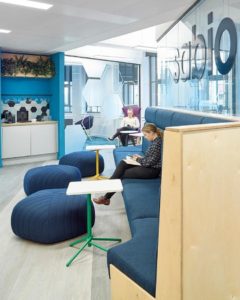A week may indeed be a long time in politics, but the fallout from recent political decisions in Westminster combined with the wider impact of ongoing global financial matters is making the world of FM a similarly dynamic place to be working right now.
Businesses still learning to grapple with the long-term implications of the global pandemic and its impact on the working environment are now having to adapt, and quickly, to the added demands brought about by the skyrocketing costs of materials, consumables and, of course, utilities. Whilst business owners and HR departments up and down the country have been agonising over the right hybrid model or flexi-working arrangement to offer their employees, it seems that external matters may now be more of a deciding factor.
So, how do potential three-fold or more increases in the cost of heating and lighting in the workplace impact the role and expectations of the FM department? And how will these changes affect opinions on the return to the workplace and impact the ambitions of carbon reduction and net zero?
Is strategic FM the answer?
The Government may have recently announced the Energy Bill Relief Scheme (EBRS), which will run until March of next year, but the associated discounts are not straightforward and are dependent on the individual contractual arrangements and tariffs for each business. At the end of the day, cost savings and efficiencies will come down to good old fashioned ‘housekeeping’ measures, which of course are the domain of FM teams. FMs who have been driving the climate change agenda in their workplaces, whilst also trying to implement carbon reduction initiatives, may now find some of these targets easier to achieve. There is nothing like a direct link to the bottom line to focus the minds of those with responsibility for balancing the books.
Facilities Managers up and down the country will no doubt be having conversations with their client representatives, FDs and MDs addressing the question, “What are we doing to reduce our energy consumption?” FM teams will be expected to identify and quickly implement a number of measures to achieve this; the starting point is generally the energy audit. This doesn’t need to be over-complicated or require specialist input. A simple baseline assessment to determine what is being consumed where and when is a good starting point. An out-of-hours walkabout of the premises will often reveal unexpected sources of unnecessary energy consumption. The next step is then a strategic approach to building systems management tied to customer communication and education. You should be having follow up conversations like, “Yes, we will be adjusting the BMS settings to reduce the ambient temperature to 20C.” Stickers next to every light switch reminding staff to ‘switch off’ when they leave the room isn’t exactly a new idea; however, rolling this measure out again today, with a fresh impetus linked to what is high in everybody’s current consciousness, should have positive results. As ever, it’s the little things that count.
Does this change people’s minds about a return to the office?
There’s been an abundance of research indicating a disconnect about the post-pandemic return to the office, with many studies estimating a number of CEOs want a quick and fulltime return to the office for both themselves and their staff. The staff themselves in these studies are far more reticent, with only about one quarter expressing similar desires. That of course was at the beginning of the year, before the war in Ukraine and certainly before the recent political turmoil that has impacted both domestic and global energy markets. It was also at the beginning of what turned out to be, on the whole, a long and warm summer. How things have changed.
Now that winter is looming large, are these same staff still so keen to be working from home? Does the prospect of keeping the home well-lit and warm whilst keeping up a daily schedule of Teams meetings seem quite so appealing? Many businesses have been encouraging their staff to return to the workplace, possibly on a flexible or hybrid basis, by extolling the benefits of doing so (like collaboration with colleagues, shared working experiences, face-to-face meetings and of course the social benefits that come from being together). Some businesses are even introducing free lunches, free gym usage and childcare facilities.
Faced with such huge rises in domestic heating bills and food costs, who wouldn’t want to take full advantage of such incentives. On the flipside however, businesses will now be looking at the practical costs of such offerings. During the lockdown, when it was a necessity for staff to work from home, many workplaces were effectively mothballed resulting in only minimal requirements for background heating and lighting. Whilst no one will be suggesting a return to similar measures, keeping a suite of meeting rooms serviced with heating, lighting, teas/coffees and a meal service during every day of the week would now seem very wasteful. Will staff be encouraged to again work remotely where possible?
The solution, as ever, will be complicated and will require the strategically thinking FM to be considering all of the options. Dialogue from leadership should be happening in order to understand the dynamics of the situation and the expected outcomes. Costs savings and efficiencies associated with anything and everything property related has always been a challenge set at the door of the FM department. The current political and financial situation is only acting to heighten this expectation. So, if you haven’t already, get the conversation going now as things are only going to get worse before they get better.




